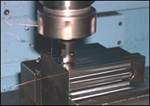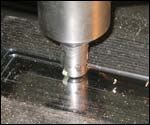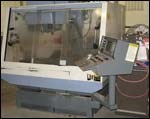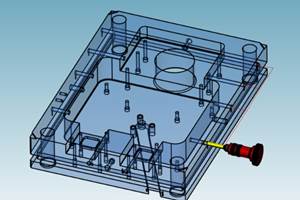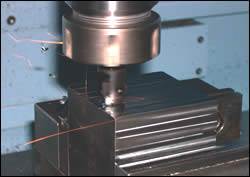Ceramic Cutting Tools: A Cut Above
Continuous machining with new ceramic mill reduces machining time by 88 percent—saving time and money.
In the vinyl extrusion industry, Premium Building Products (West Salem, OH) also manufactures and repairs its own molds. Recently, the company downsized its machine shop, reducing 12 machinists to just three journeyman machinists, one machinist and one fabricator. Luckily, the company had already been working with a new cutting tool that reduced machining time so it didn’t suffer with the reduction in manpower.
Greenleaf Corporation’s (Saegertown, PA) The Excelerator™ mill—a combination of indexable ceramic inserts and small diameter milling cutters—reduced Premium Building Products’ cycle times by 88 percent and allows the company to continuously machine its steel. The tool also allowed the company to eliminate running a second shift on its Okuma Howa (Charlotte, NC) machining center.
Time for a Change
In operation since 1979, Premium Building Products’ entire facility is 176,000 square feet—with 6,000 square feet of this space devoted to the company’s machine shop. According to Dan Sheipline, supervisor/programmer/designer and journeyman tool and die maker, the company’s work with common and exotic grades of stainless steel are very unforgiving to standard carbide tooling. He was faced with the challenge of excessive tooling wear, which caused difficulties with the machining process and cost.
To further complicate matters, the parts Premium Building manufactures are part of one main assembly, which must match within +-.002". “The finish is the most important as our finished parts require a mirror surface free of defects,” Sheipline explains. “The parts must be hand polished regardless of the machining operation, but the Greenleaf tool leaves minimal tool marks left over to polish—compared to carbide tooling.” The cutting tools Sheipline had been using also left him unable to complete simple machining operations without needing to change the cutting tool.
After contacting a number of cutting tool manufacturers, Sheipline was impressed with Greenleaf’s knowledge of cutting tools—and by the fact that it was the “only organization willing to initiate the development of a prototype tool, which is now a member of their product line, where as others tucked their tail and ran. When I initially contacted other tooling vendors, most of them were more than eager to stop in and demo a cutter that they thought would work, but after a few test cuts using their ‘slow’ machining parameters (not the parameters that I was looking for). We were left with a worn tool that they wanted to sell me.
“I don’t mean to criticize other cutting tool manufacturers, but these results were not acceptable to me,” Sheipline continues. “As for Greenleaf, they would bring in their prototype tool and ask me what parameters I wanted to run the tool, so we did—successfully—and then they would do some calculations based on the results and inform me that I had not even begun to see the capacities of this tool.”
Saving Time/Money
Once Premium Building started using the Excelerator, the company quickly realized “incredible time and money savings,” Sheipline states (see Chart 1). “The bottom line is this tool enables us to continuously machine three to four parts before we had to rotate the inserts,” he explains. “Previously, we were forced to changes cutters two times just to finish one part.”
As a result, Premium Building Products also purchased a new machine—a Leadwell (Plano, TX) MCV-OP machining center with an rpm capacity of 6000 rpm (versus the machine the company had at 4000 rpm)—which ultimately means faster machining. This machine takes better advantage of the speeds the Excelerator brings to its work, Sheipline maintains.
Premium Building Products is extremely satisfied with its new cutting tool and the level of customer service it receives from Greenleaf. “During our R&D, other cutting tool manufacturers would leave us with a broken tool, telling me that they would get with their engineers and be in touch,” Sheipline comments. “I never heard from them again. On the other hand, with Greenleaf, I had to all but ask them to leave the building. They were determined to make our process better—and they did.”
| Chart 1 | |||
| Tooling Analysis | |||
| 3/4" carbide insert cutter |
3/4" ceramic insert cutter | ||
| RPM | 1250 | RPM | 4000 (MACHINE MAX) |
| IPM | 12 IPM | IPM | 50 IPM |
| Depth of Cut | .015" | Depth of Cut | .045" |
| Step Over (Pic) | .375" | Step Over (Pic) | .1875" |
| Entry Mode | 2° RAMP | Entry Mode | .4° RAMP |
| Coolant Type | WATER SOLUBLE | Coolant Type | VORTEC AIR BLAST |
| Parts Machined | 1 | Parts Machined | 3 |
| Insert Condition | JUNK | Insert Condition | WORN (NEED ROTATED) |
| TOTAL CYCLE TIME | 1:24(hr-min) | TOTAL CYCLE TIME | 13:(min) |
| Difference Cost Savings |
1:11(hr-min) @$72.85=$86.20 |
||
| NOTE: Test performed on EL-MAX@ 25-30 RC. NOTE: 30 ipm changed to 50 ipm, cutter performed same, surface finish rougher. |
|||
Related Content
CAM Automation Increases Mold Production, Quality
Mold builder switches CAM software package after 20 years to take advantage of innovative programming strategies that reduce mold machining programming and processing times.
Read MoreFive-Axis Vertical Mill Increases Mold Shop Capacity by Reducing Setups
Zero Tolerance now processes blocks — from squaring to waterline drilling to rough and finish milling — on a single five-axis CNC mill, reducing setups and moving blocks in/out of multiple machines without sacrificing accuracy and surface finish.
Read MoreLaser Welder Yields Fast, Precise Mold Repair
Intralox's integration of the Alpha Laser ALFlak has significantly improved their tool room efficiency when it comes to difficult welds and urgent repairs.
Read MoreCT Scanning Helps Micro Molder Reduce Cost of First Article Inspections
CT scanning services performed by 3D ProScan, a division of NyproMold Inc. provides MTD Micro Molding with accurate, high-resolution internal and external measurements performed about seven times faster and at significant cost savings.
Read MoreRead Next
What Ceramic Insert Technology Can Do for Moldmakers
The benefits of hard milling with ceramics in mold manufacturing.
Read MoreAre You a Moldmaker Considering 3D Printing? Consider the 3D Printing Workshop at NPE2024
Presentations will cover 3D printing for mold tooling, material innovation, product development, bridge production and full-scale, high-volume additive manufacturing.
Read MoreHow to Use Continuing Education to Remain Competitive in Moldmaking
Continued training helps moldmakers make tooling decisions and properly use the latest cutting tool to efficiently machine high-quality molds.
Read More
